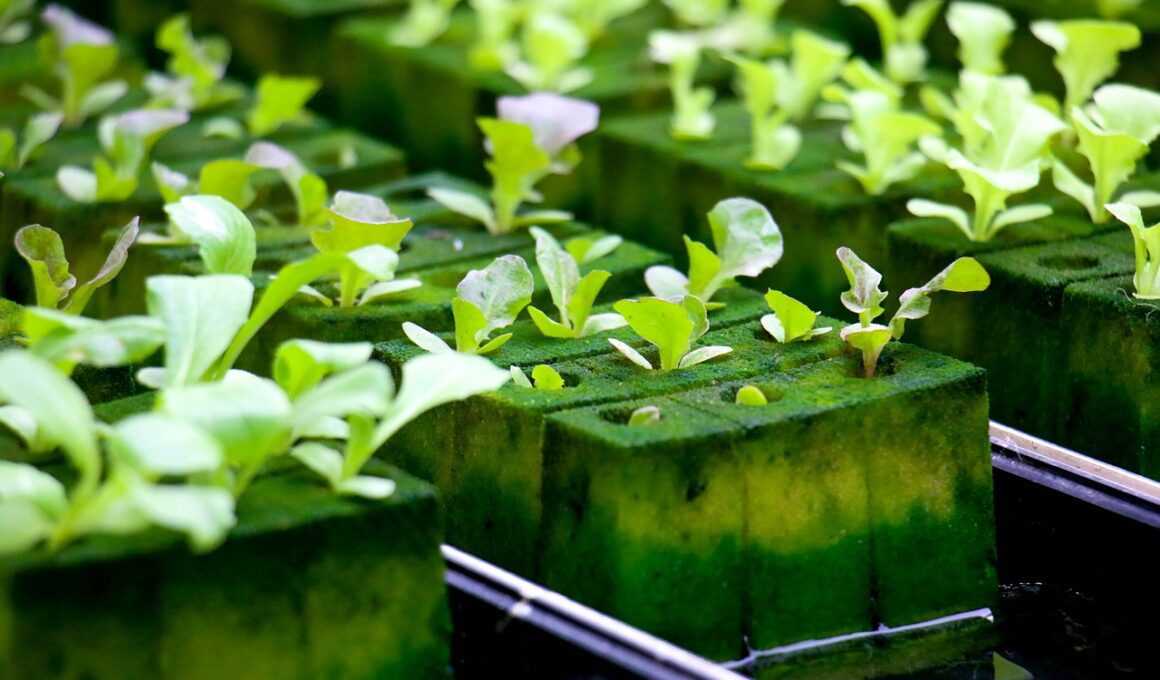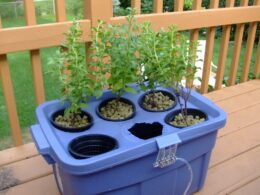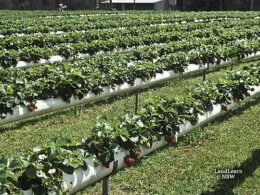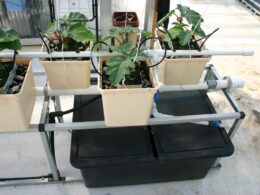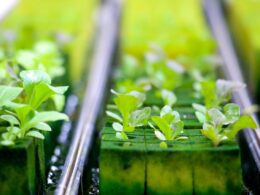Are you considering starting a hydroponic system but unsure of what water source to use? Choosing the right water source for your hydroponics is crucial to ensure the health and growth of your plants. With so many options available, it can be overwhelming to determine which one is best for your system.
In this article, we will explore the different types of water sources suitable for hydroponics and their advantages and disadvantages. It’s important to note that not all water sources are created equal. Using the wrong water source can negatively impact your plants and even harm your health. In addition, pH levels, temperature, and nutrient content all play a significant role in plant growth.
To help you make an informed decision, we’ll also cover the factors you need to consider when choosing a water source. By the end of this article, you’ll have a better understanding of what water source is best for your hydroponic system and how it can promote healthy and vibrant plant growth.
Types of Water Sources Suitable for Hydroponics
Here are some options for getting your hydroponic system up and running with the right liquid. When it comes to hydroponics, the water source you use is crucial to the success of your plants. In order to achieve optimal growth, you need to ensure that the water you’re using is pure and has the right nutrient content.
Water purity is one of the most important aspects of water quality for hydroponics. It’s essential that the water be free from any harmful chemicals, bacteria, or other contaminants that could be detrimental to the plants. It’s recommended that you use either distilled or reverse osmosis water to ensure that the water is pure and free from any unwanted substances. This will also help you avoid any potential issues with algae or other unwanted growth in your hydroponic system.
Another important aspect to consider when exploring different aspects of water quality for hydroponics is the nutrient content. Plants require a specific balance of nutrients in order to grow and thrive, and the water you use will play a crucial role in providing those nutrients. You can either use pre-mixed nutrient solutions or make your own using a combination of different nutrients.
It’s important to monitor the nutrient content of your water regularly to ensure that your plants are getting the right amount of nutrients they need to grow and develop properly.
Overall, choosing the right water source is essential to the success of your hydroponic system. By ensuring that your water is pure and has the right nutrient content, you can help your plants grow and thrive, all while avoiding potential issues that could harm your plants and your system. So, take the time to explore your options and find the best water source for your hydroponic setup.
Advantages and Disadvantages of Each Water Source
You’ll want to weigh the pros and cons of each option before deciding which one will work best for your hydroponic system.
Let’s start with tap water. It’s readily available and easy to access, making it a convenient choice. However, tap water can contain impurities and chemicals that may harm your plants. It also has a variable pH level, which can affect nutrient absorption.
Another option is distilled water. It’s pure and free from contaminants, making it a safe choice for your plants. However, it can be expensive and may not be readily available in some areas. Additionally, distilled water lacks essential minerals that your plants need to thrive. This means you’ll need to supplement with nutrients, which can be costly.
Finally, there’s rainwater. It’s free and abundant, making it an eco-friendly choice. Rainwater is also naturally soft and has a neutral pH level, which is ideal for hydroponics. However, collecting and storing rainwater can be challenging, and it can also contain pollutants from the atmosphere.
You’ll want to consider the pros and cons and do a comparison analysis before choosing the best water source for your hydroponic system.
pH Levels and Their Effect on Plant Growth
Understanding how pH levels affect your plants’ growth is crucial for creating a thriving and healthy hydroponic system. The pH level of your nutrient solution plays a significant role in how well your plant roots can absorb the necessary nutrients. If the pH level is too high or too low, it can hinder your plant’s growth and even cause nutrient deficiencies.
Ideally, the pH level for hydroponic systems should be between 5.5 and 6.5. When the pH level is within this range, your plant roots can absorb all the necessary nutrients, leading to healthy and robust plant growth. If the pH level is too high or too low, your plant roots will struggle to absorb the essential nutrients they need, which can lead to stunted growth and other problems.
It’s important to regularly test the pH level of your nutrient solution and adjust it if necessary. Using a pH testing kit is an easy and affordable way to ensure your plants are getting the nutrients they need to thrive.
By paying attention to the pH level of your nutrient solution, you can help your plants grow and flourish in your hydroponic system.
Can the Water Source Affect the Effectiveness of Fertilizer in Hydroponics?
The water source plays a significant role in determining the effectiveness of fertilizer in hydroponics. Choosing the best hydroponic fertilizer for lettuce is essential, but if the water used to dissolve and distribute the fertilizer contains contaminants or imbalanced nutrient levels, it can hinder plant growth. Therefore, maintaining a clean and well-balanced water source is crucial to optimize the effectiveness of the chosen fertilizer in hydroponic systems.
Factors to Consider When Choosing a Water Source
When choosing a water source for your hydroponic system, there are a few key factors to consider. First, accessibility is important as you want to make sure you have a reliable and convenient source of water.
Secondly, cost should be taken into account as some water sources may be more expensive than others.
Lastly, water quality is crucial for the health and growth of your plants, so it’s essential to choose a source that provides clean and suitable water.
Accessibility
If you’re looking to optimize the growth of your hydroponic plants, it’s important to consider the accessibility of your water source. Choosing a water source that’s easy to access and readily available will make it easier for you to maintain your hydroponic system and ensure that your plants are getting the nutrients they need.
You should also consider the water storage and filtration methods you’ll be using to ensure that your water supply is clean and free from contaminants. One option for an easily accessible water source is tap water. It’s readily available in most homes and can be used for hydroponic systems with the right filtration methods. However, you should be aware of potential contaminants in tap water, such as chlorine or fluoride, that may need to be removed before use.
Another option is to collect rainwater or use a well as your water source. These options may require more effort to access and store, but they can provide a more natural and chemical-free water supply for your hydroponic system.
Cost
The cost of setting up a hydroponic system can vary depending on the equipment and materials needed. However, the good news is that hydroponics can be a cost-effective way to grow plants as it eliminates the need for soil, which is usually one of the most expensive components of traditional gardening.
Here are some cost factors to consider when choosing a water source for your hydroponic system:
-
Installation process: Some water sources may require more complex installation processes than others. For example, if you choose to use a rainwater harvesting system, you may need to install a collection and filtration system, which can be more expensive upfront. On the other hand, if you use tap water, the installation process may be as simple as connecting a hose to your system.
-
Maintenance requirements: Different water sources may require different levels of maintenance. For example, tap water may contain chlorine or other chemicals that can harm your plants, so you may need to invest in a water filter or treatment system. Alternatively, rainwater may be more prone to contamination from environmental pollutants, so you may need to test and treat the water regularly.
Considering these factors can help you choose a water source that’s both cost-effective and easy to maintain. By choosing the right water source for your hydroponic system, you can save money in the long run while also ensuring the health and safety of your plants.
Keep in mind the installation process and maintenance requirements when weighing your options, and don’t be afraid to consult with experts or do some research to find the best solution for your needs. With a little bit of planning and investment upfront, you can enjoy the benefits of hydroponics for years to come.
Water Quality
You need to ensure that the quality of the water you use in your hydroponic system is high to guarantee healthy and thriving plants. The first step to achieving this is by using a water filtration system to remove any contaminants in the water. This is important because contaminants such as chlorine, fluoride, and heavy metals can negatively affect the nutrient content of the water. This, in turn, can affect the health of your plants.
It’s also important to monitor the nutrient content of your water. This ensures that your plants are receiving the appropriate levels of essential minerals and nutrients. You can do this by using a water testing kit to measure the pH level and nutrient content of your water.
By taking these steps, you can ensure that your plants are receiving high-quality water. This will help them grow and thrive.
Conclusion: Choosing the Right Water Source for Your Hydroponic System
When it comes to selecting the ideal water for your hydroponic system, it’s crucial to keep in mind that the success of your plants is directly connected to the quality of the water you choose.
To help you make the best decision, here are some important considerations to keep in mind:
-
Water Purity: The water you choose should be free of any contaminants, such as heavy metals, chlorine, or pesticides. Using impure water can harm your plants and impact their growth negatively.
-
Environmental Impact: It’s important to choose a water source that is sustainable and environmentally friendly. Collecting rainwater, for example, is an excellent way to reduce your carbon footprint while ensuring the purity of your water.
In addition to these factors, it’s also essential to consider the pH level of your water, as well as its mineral content. Testing the water regularly can help you maintain the proper balance for your plants.
By considering all of these factors, you can choose the right water source for your hydroponic system and set your plants up for success. Remember, healthy plants start with clean, pure water.
Frequently Asked Questions
Can I use tap water for hydroponics?
If you’re considering using tap water in hydroponics, there are both pros and cons to consider. On the positive side, tap water is readily available and affordable. However, it may contain chemicals, minerals, and other contaminants that can harm your plants.
To mitigate these risks, it’s recommended to filter and treat your tap water before using it in your hydroponic system. You can use a variety of methods, including reverse osmosis, activated carbon, and UV sterilization, to remove impurities and ensure your plants receive clean, healthy water.
By taking these steps, you can enjoy the convenience of using tap water in hydroponics without compromising the safety and health of your plants.
Is rainwater a suitable water source for hydroponics?
Rainwater can be a suitable water source for hydroponics, but it requires proper filtration before use.
In addition to rainwater, there are other alternative water sources that can be used such as well water or water from a pond or lake.
However, it’s important to ensure that the water is free from harmful chemicals, pollutants, and pathogens that can harm your plants.
Therefore, using a rainwater filtration system or testing alternative water sources before use is essential to ensure the safety and health of your hydroponic plants.
Can I use well water for hydroponics?
When it comes to using well water for hydroponics, it’s important to consider the quality of the water. Well water can contain high levels of minerals, which can be harmful to plants. To ensure the well water is safe for hydroponics, it’s essential to use a well water filtration system.
This will remove any impurities and provide a clean water source for your plants. However, if you’re unable to use well water, there are alternative water sources for hydroponics, such as filtered tap water or rainwater.
Ultimately, the best water source for hydroponics is one that is clean, free from contaminants, and has the right balance of nutrients for your plants to thrive.
How often should I change the water in my hydroponic system?
To maintain a healthy hydroponic system, it’s essential to change the water regularly. You don’t want to keep stagnant water for too long, as it can become a breeding ground for bacteria and algae, which can harm your plants.
A general rule of thumb is to change the water every two to three weeks. However, this can vary depending on factors such as the size of your system and the type of plants you’re growing.
To reduce water usage, you can implement a few tips, such as using a water chiller to maintain the optimal temperature for your plants and recirculating the water instead of constantly replacing it. These practices not only save water but also provide additional benefits like improved plant growth and nutrient uptake.
How do I test the quality of my water source for hydroponics?
To ensure the quality of your water source for hydroponics, it’s crucial to test the water pH levels and dissolved mineral content. High levels of minerals, such as calcium and magnesium, can lead to nutrient imbalances and pH fluctuations in your hydroponic system.
To test the water pH, use a pH test kit or meter to measure the acidity or alkalinity of the water. For dissolved mineral content, you can use a total dissolved solids (TDS) meter to measure the concentration of minerals in the water.
Keeping an eye on these factors will help you maintain a healthy and safe hydroponic system for your plants to thrive.
Conclusion
Now that you’ve learned about the different types of water sources suitable for hydroponics, their advantages and disadvantages, and the importance of pH levels, it’s time to choose the right water source for your own hydroponic system.
Consider factors such as cost, availability, and the specific needs of your plants. Don’t forget to regularly test and adjust the pH levels to ensure healthy plant growth.
With the right water source and proper maintenance, your hydroponic garden is sure to thrive. Happy growing!





